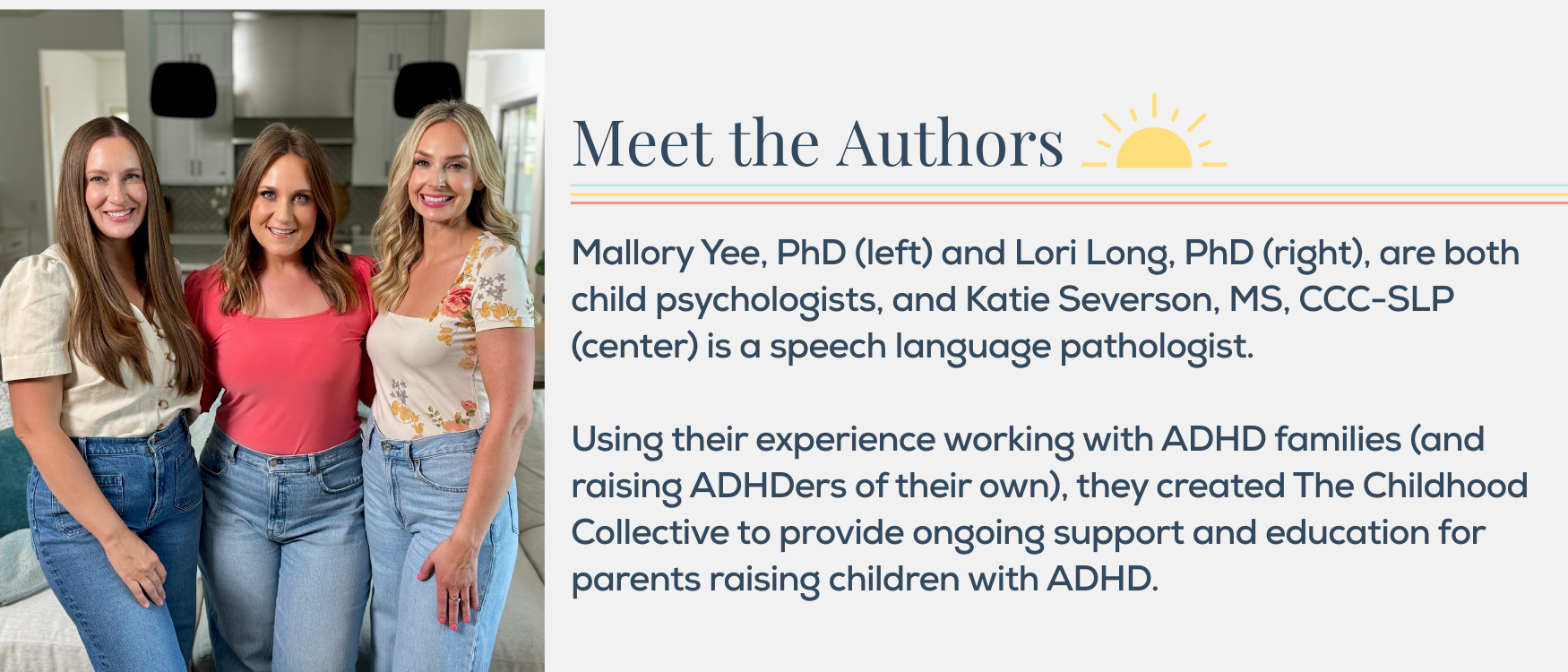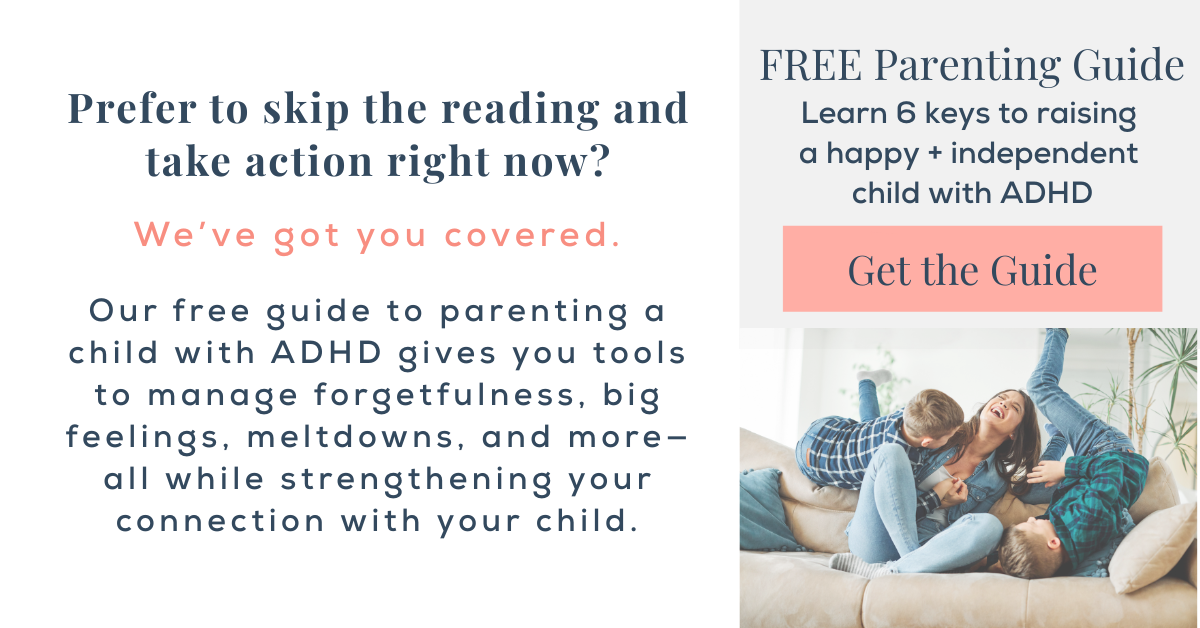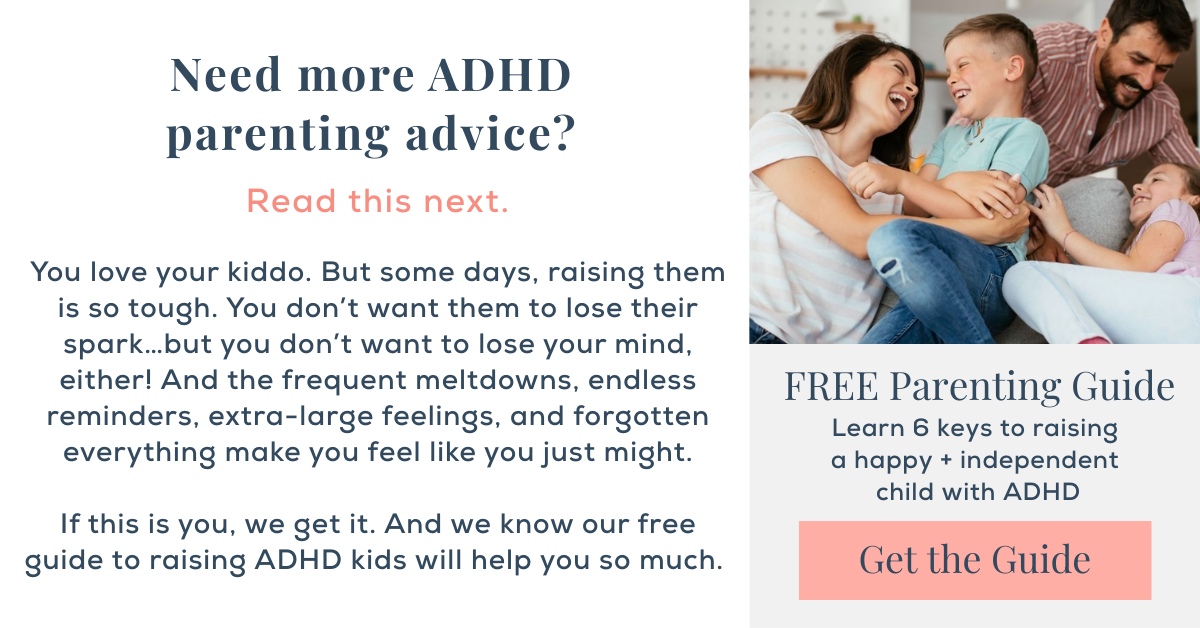All kids lie sometimes, but for kids with ADHD, lying tends to be more common, which is a tough thing for ADHD parents, like us, to handle.
When our kids with ADHD lie, we understandably assume it’s a sign we’ve done something wrong. Or worse, that their lying will lead to cheating, stealing, or just a general lack of concern for others. Then, we panic a little. Are they on a path to manipulating others? Getting in trouble? Becoming a “bad” kid? Going to jail?!
If you’re concerned, we get it—but we also want to help you put your child’s lying into perspective. More often than not, lying is simply a sign of unmanaged ADHD symptoms getting in the way of our kids doing the right thing (which is what most of them want to do). The good news is that their lying will very likely lessen with support and in time.
In this post, we explain why kids with ADHD lie and how you can address it in an ADHD-friendly way that addresses the situations that make them feel the need to lie.
Jump To The Answer You Need
- Why Kids with ADHD Lie
- What to Do When Your ADHD Child is Lying
- Tip: Don’t “Invite” a Lie
- What To Do If You Catch Them In A Lie
- Free Guide to ADHD Parenting
Why Kids with ADHD Lie
First, it’s important to note that lying is a normal part of cognitive development. It typically starts between the ages of 4 and 6, when young children learn that others can’t read their minds and that their thoughts are private. In this sense, lying is a positive thing—but once you get past the excitement of your child meeting (ha!) of your child meeting this important cognitive milestone, odds are you’ll want to know how to discourage it.
Even though some lying is considered normal for all kids, it’s a bit more complicated and common in kids with ADHD. Some kids with ADHD even demonstrate what we call “compulsive lying.” This isn’t because ADHD kids are “bad” or more “naughty” than their peers, rather, it’s a product of how their brain is developing.
Related article: Is Your ADHD Child Defiant? 4 Possible Reasons Why!
Inattention and Impulsiveness
ADHD kids tend to live in the moment (or “demonstrate inattention to the future,” as Dr. Russell Barkley would say). So they may tell a lie to get out of an undesirable task or punitive consequence. In the moment, this lie could seem like the perfect solution, but that’s only because they haven’t considered how they could be caught in the lie later, or how it might affect someone else.
Struggle & Low Self-Esteem
Lying is often rooted in true struggle. Kids with ADHD may lie to get out of tasks that are really challenging for them. They may also lie to preserve their self-esteem or to be seen by adults or peers in a certain light as they seek social validation.
What to Do When Your ADHD Child is Lying
It helps to understand the reasons why your ADHDer may lie. But the ultimate question is what to do about it. So, let’s get into it:
#1 Identify The Real Issue
Whether it’s to hide their struggle, boost their self-esteem, cover up a forgotten task, or get out of an undesirable situation, lying always serves a purpose for our children. If your child with ADHD is lying a lot, the first thing to do is figure out why.
TRY THIS
- When is the lying happening?
- What are their lies typically about?
If lies are often related to homework, your child may be truly struggling with it and lying to avoid the shame and discomfort of facing that. Maybe, without meaning to, they keep forgetting about their homework and lying to “cover their tracks.” Once you know the real reason behind the lies, you have the information you need to address the root cause.
#2 Make a Plan Together To Address The Real Issue
Talk to your child about the root cause of their lies in a non-judgmental manner. Listen and remain calm, even if you feel frustrated or concerned. Ask questions to determine why your child is struggling, and try to understand your child’s perspective as best you can.
TRY THIS
Talk to your child and come up with a plan to solve the problem that makes them feel supported. If you’re not sure how to approach the conversation, you could say something like:
“I want to talk with you about something your teacher shared with me. You’re not in trouble, and won’t get in trouble for telling me the truth. I want to understand what you’ve been thinking and feeling so I can help you.”
Let them know you’ll work on getting them the support they need at school and at home. And let them know they can work on being open and honest if they’re struggling. You could say,
“I would love to hear your ideas about how we can make this easier for you. Your teacher and I want to ensure you get the help and support you need.”
#3 Create A System To Teach Honesty
Create a reward system at home or school to praise or reward your child for their honesty in different situations. Focus on increasing what you want (honesty) rather than punishing what you don’t want (lying). Then, reward them after they’re consistently honest for a period of time.
Related article: 10 Do’s and Don’ts for Using Rewards to Improve Your Child’s Challenging Behavior
#4 Give Fair and Appropriate Consequences
The best consequences are logical and fair. So, especially if your child is lying to avoid punishment, make sure the consequences you give them are consistent and not overly punitive. We’re not saying kids should “get away with” lying, but it’s important for the “punishment” to fit the crime. Otherwise, you could inadvertently motivate them to lie even more in the future!
Tip: Don’t “Invite” a Lie
It sounds out there, but many parents “invite” their kids to lie without realizing it. We’ve done it before! And we bet you have, too.
Let’s say you’re wondering who ate the rest of the brownies, and you see your child with chocolatey fingers and chocolate smeared across their face. A question like “Did you eat the brownies?!” is actually an invitation to lie in this moment. (It’s so easy and tempting for them to say no, right?!)
If you already know the answer, instead of “testing” your child to see if they’ll tell the truth, calmly let them know what you know or observed and move forward from there. In our brownie example, that would mean saying something like, “I see that you ate the rest of the brownies without asking…” and proceeding from there.
What To Do If You Catch Them In A Lie
It’s incredibly frustrating to catch your child in a lie, especially if it’s a frequent occurrence. Do your best to stay cool, calm, and collected because overreactions can have the opposite effect and actually increase lying as your child tries to avoid your emotional response. Then, once everyone is calm and it feels appropriate, offer your child a “re-do” or “do-over.”
For example, let’s say your child has indicated that they don’t have homework. You open their backpack, only to find an unfinished math packet. You could say,
“Hmmm. You said you don’t have homework, but I found an unfinished math packet in your backpack with a due date of tomorrow at the top. Want to give that another shot? Let’s try again… Do you have any homework tonight?”
This allows your child to tell the truth without being overly punitive. And helps them accomplish the ultimate goal: getting their homework done.
Don’t Panic! Good Kids Lie.
We know lying is jarring—especially when they do it so easily or straight to your face. Try your best to keep your cool and remember two things:
- Lying is a normal part of development for all kids.
- For our ADHD kids, lying reflects the differences in their brain and executive function.
It’s okay and appropriate to give fair consequences for the lying itself, but try your best to get to the heart of their lying, too. Then, work with your ADHDer to come up with a plan that supports them by addressing any unmanaged or unsupported symptoms leading them to lie. This is the best way to address their lying in both the short- and long-term!
Have a wonderful week,
Katie, Lori, and Mallory









We call do-overs “do-betters”.
I’d like a do-better. Hold you like a do-better? Then disregard the first response, that was the emotional one. The do-better is closer to making a thoughtful choice. Followed by affection it is rewarding & safe.
I love that! Thanks for sharing!